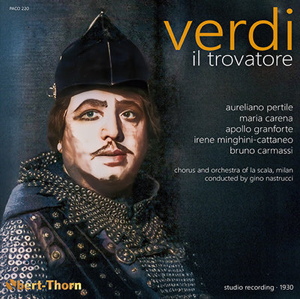
Giuseppe Verdi (1813-1901)
Il trovatore
Manrico – Aureliano Pertile (tenor)
Leonora – Maria Carena (soprano)
Conte di Luna – Apollo Granforte (baritone)
Azucena – Irene Minghini-Cattaneo (mezzo-soprano)
Ferrando – Bruno Carmassi (bass)
Chorus and Orchestra of Teatro alla Scala, Milan/Gino Nastrucci
rec. 24 October – 26 November 1930, Conservatorio, Milan, Italy
Producer and Audio Restoration Engineer: Mark Obert-Thorn
Full score and vocal score enclosed
Pristine Audio PACO220 [2 CDs: 115]
I have to admit that I was totally enthralled by this almost 94-year-old HMV-recording of Verdi’s blood-and-thunder Il Trovatore. I was not entirely unprepared, having read my colleague Ralph Moore’s survey of Trovatore recordings three years ago, which is also quoted in the documentation to this issue. What is not quoted is the first sentence: “This recording is not for audiophiles…”, something that he immediately modifies by saying: “…but that does not mean that you have to put up with distant squawking overlaying someone having an almighty fry-up. No; these are very listenable discs as long as you do not demand modern, stereo sound.” Hearing it in Mark Obert-Thorn’s superb restoration, there is no longer any need for an apology. The sound is full and lifelike, even the chorus and orchestra can be appreciated by the most inveterate opponents to historical recordings. The singers also ring out with a presence that presents them in all their glory – and what voices they are.
In most of these early electrical recordings many of the singers seem to be second rank, but here we meet the cream of the elite. Take for instance the first solo voice we hear, Ferrando, the chief officer of Luna’s soldier. He is sung by Bruno Carmassi with solid, steady tone, sonorous and beautiful – and expressive. Today he is largely forgotten, but he had a long career and sang in the 1950s opposite Callas. Maria Carena as Leonora was also previous unknown to me, and impressed greatly. A beautiful voice, strong but admirably nuanced, technically impeccable and she handles the coloratura expertly too. This was obviously her only recording, which perhaps says something about the general standard of the singing in the period. Apollo Granforte was one of the greatest baritones of the period, and his is a really classy voice, big, steady and sonorous. Il balen in the second act should be a model for any young baritone. Irene Minghini-Cattaneo recorded Amneris in 1928 and returned as Azucena two years later. In both cases, she was formidable. Her Stride la vampa can compete with Simionato and Cossotto and the whole scene with Pertile is one of the highpoints in this recording. Obviously they had a very special rapport, and in the last act Ai nostri monti is deeply moving, with both singers at their most sensitive and lyrical. Otherwise Pertile can sometimes be a bit wayward, overemphatic and pushing his voice past its limits. But it is a glorious instrument, and generally he is well-behaved.
All in all one couldn’t wish for finer singers – and bear in mind that almost simultaneously – in September 1930 – Italian Columbia recorded another highly recommendable Il trovatore with La Scala forces under Lorenzo Molajoli, so competition was keen also in those days. It also shows that there were a large number of excellent singers around, steeped in the Italian tradition. But opera is not only a matter of singing; there is also need for a conductor with dramatic insight. HMV’s counterpart to Molajoli was normally Carlo Sabajno, and he has hitherto been credited as the conductor of this Trovatore, but recent research has found that, apart from two 78 rpm sides, it was his assistant Gino Nastrucci, who “ghost-conducted” the lot – and he was indeed no mean conductor. From the beginning he sets the pace, and the opera literally fizzes along with an energy and dramatic thrust that is overwhelming but without rigidity. The lyrical and sensitive scenes, like the Azucena/Manrico encounters are in no way skimmed over. Nastrucci knows what he is doing, and it is only fair that he at long last gets credit for it.
Of course, this recording can never replace the foremost modern stereo recordings – Serafin, Mehta, Bartoletti, Giulini – for sonic splendour, but it is a wonderful alternative, and gives a glimpse of singers from an earlier generation with insight in the tradition.
Göran Forsling
Availability: Pristine ClassicalOther cast
Ines – Olga de Franco (soprano)
Ruiz – Giordano Callegari (tenor)
Un vecchio zingaro – Antonio Galli (bass)
Un messo – Giordano Callegari (tenor)


















